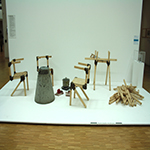Euroacademia Conferences
 Europe Inside-Out: Europe and Europeanness Exposed to Plural Observers (9th Edition) April 24 - 25, 2020
Europe Inside-Out: Europe and Europeanness Exposed to Plural Observers (9th Edition) April 24 - 25, 2020 Identities and Identifications: Politicized Uses of Collective Identities (9th Edition) June 12 - 13, 2020
Identities and Identifications: Politicized Uses of Collective Identities (9th Edition) June 12 - 13, 2020 8th Forum of Critical Studies: Asking Big Questions Again January 24 - 25, 2020
8th Forum of Critical Studies: Asking Big Questions Again January 24 - 25, 2020 Re-Inventing Eastern Europe (7th Edition) December 13 - 14, 2019
Re-Inventing Eastern Europe (7th Edition) December 13 - 14, 2019 The European Union and the Politicization of Europe (8th Edition) October 25 - 26, 2019
The European Union and the Politicization of Europe (8th Edition) October 25 - 26, 2019 Identities and Identifications: Politicized Uses of Collective Identities (8th Edition) June 28 - 29, 2019
Identities and Identifications: Politicized Uses of Collective Identities (8th Edition) June 28 - 29, 2019 The European Union and the Politicization of Europe (7th Edition) January 25 - 26, 2019
The European Union and the Politicization of Europe (7th Edition) January 25 - 26, 2019 7th Forum of Critical Studies: Asking Big Questions Again November 23 - 24, 2018
7th Forum of Critical Studies: Asking Big Questions Again November 23 - 24, 2018 Europe Inside-Out: Europe and Europeanness Exposed to Plural Observers (8th Edition) September 28 - 30, 2018
Europe Inside-Out: Europe and Europeanness Exposed to Plural Observers (8th Edition) September 28 - 30, 2018 Identities and Identifications: Politicized Uses of Collective Identities (7th Edition) June 14 - 15, 2018
Identities and Identifications: Politicized Uses of Collective Identities (7th Edition) June 14 - 15, 2018
Theatre for Reconciliation: David Hare and David Greig
-
-

-
Presentation speakers
- Dilek Inan, Balikesir University, Turkey
- Download presentation
Abstract:
As a public art form, theatre has long been recognized as a space for the examination and performance of power, protest, intervention, mediation and identity. This paper aims to investigate the relations between the political and the theatrical and to explore the issues of enactment, representation, interrogation and the nature of intervention in two contemporary British plays. Both David Hare and David Greig are occupied and fantasized by The Middle East conflict and thus have produced a number of plays in order to propose exceptional criticism about the prejudices, passions and mutual suspicions. David Hare wrote Via Dolorosa in 1998 after his visit to Israel and the Palestinian lands in order to offer enlightenment to audiences about the world’s most stubborn conflict and to emphasize theatre’s role as a medium for criticism. Similarly, Greig’s Damascus (2007) is the outcome of his visits to the Middle East in order to train young Arab playwrights, which is an act of ethical practice in itself. Hare’s play explores the vulnerability of everyday life in the Middle East and calls for compassion. Similarly, Greig discovers a series of cultural confusions between the English abroad and the Eastern values in order to point to the complexities of relations between the West and the Arab world by revealing the gap between what Westerners think they know about the Middle East and the reality. This paper compares and contrasts the different attitudes towards reflecting the theatre’s role for reconciliation and criticism. Both playwrights question and criticize the debate on the Western model of civilization and its projection across the globe. In their creative and critical modes, both writers accredit the stage as a place for representing the human condition in mythical lands and as a place for change. In a Brechtian sense both playwrights have used the theatre as criticism modelling on the Lehrstück.
-


















